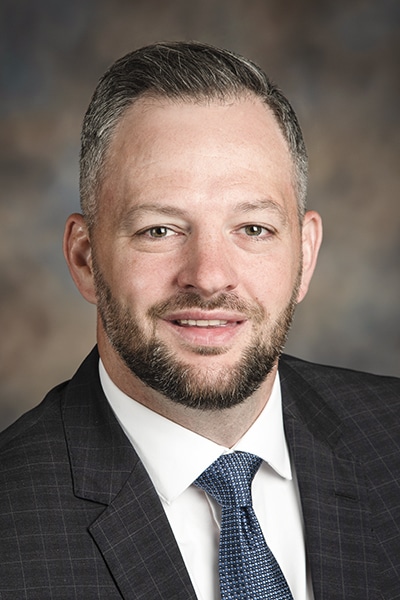Cole Elmer knows how to lead a team to success. A former team leader and sergeant with the Illinois Army National Guard, Elmer has seen the benefits of trust, communication, and perseverance firsthand. Today, as vice president of revenue management at BJC HealthCare, Elmer has been guiding teams both within his department and throughout the company through a number of cutting-edge initiatives designed to carry the organization into the future.

Elmer joined the Army National Guard in 2000, while in college. “I went to basic training before 9/11, but when I got back from training that September, I watched the second airplane slam into the World Trade Center,” Elmer recalls. “At that moment, I had a startling realization—that I would be going to war.”
Elmer was deployed to Iraq from 2004 to 2005, during which time he formed “unbreakable” bonds with the men and women serving with him. “But I also had a lot of time to think about what I wanted to do after I got back from Iraq,” he says. “I knew that healthcare was a stable industry, so I decided to put my efforts toward health planning and administration at the University of Illinois.
“I had no idea what the healthcare revenue cycle was when I first heard a company speak about a career in it,” Elmer recalls, laughing. “But I put my résumé on the pile after a company recruiting presentation, got a job with a revenue cycle management company out of Chicago, and just jumped right into it.”
Over the ensuing years, Elmer gained experience in several different areas of the healthcare industry, working on the third-party side, provider side, and business development as well as consulting. Of course, “not everything was my forte,” Elmer jokes. “But it was a lot of great experiences overall.”
And in February 2019, Elmer’s wide-ranging experience earned him a spot on the revenue management team at BJC HealthCare, a nonprofit healthcare organization that encompasses two nationally recognized hospitals affiliated with the Washington University School of Medicine.
Since then, Elmer and his boss, Tracy Berry, have been collaborating with both their own teams and other teams working across BJC on an array of initiatives intended to optimize the organization’s operations as well as enhance patient care.
Patientco Partnership
According to Elmer, one of the organization’s most impactful initiatives in 2020 has unquestionably been its partnership with Patientco, a patient payment software company that focuses exclusively on the patient’s experience with their bills. “With Patientco, we will be able to meet the patient where they want to be met financially,” Elmer says.
As a result of this partnership, Elmer says, BJC patients will be able to pay their bills by phone, at any time of day or night, through an interactive voice response program; they will gain access to real-time feedback and advice through an alternative intelligence program called Chatbot Technology; they’ll be able to pay their bills through various modalities via phone, tablet, or computer through an integrated patient payment portal; and they’ll be provided with a single statement outlining the entirety of their patient balance.
“This is the kind of system where everybody wins—it increases patient yield and satisfaction while decreasing costs and bad debt,” Elmer says. “Nothing is more stressful in a household than a financial burden. We need to be able to give patients world-class clinical care as well as world-class financial care.”
“We need to be able to give patients world-class clinical care as well as world-class financial care.”
Automation Ideation
In 2019, Elmer and his team implemented an automation initiative intended not to replace any existing processes with technology but rather to initiate a conversation about those technologies with all of the teams working on the front lines at BJC.
“We collected feedback from frontline staff about the areas that they thought could be automated—redundant tasks that are repetitive in nature—so that we could position our staff to touch accounts that result in higher-yielding activities,” Elmer explains. “Out of the thirty-three ideas that were submitted, eleven were selected for automation and seven led to re-education.
“Automation is such a buzzword right now,” Elmer continues, “but this initiative has really helped reframe our thinking. We just keep coming up with fantastic ideas, one after another.”
The Pulse of the Organization
And BJC has only continued to build on the interteam dialogue fostered through initiative like the automation initiative, Elmer emphasizes. In 2020, he says, the organization will be implementing a tiered huddle system that exists on the clinical side. It is now integrating the system’s structure on the revenue cycle side, which will bring staff of all levels together to provide feedback on key questions such as, “What system issues exist today?” and “What’s going on with our payers?”
“Essentially, information from the frontline staff huddles is cascaded to the managers, then to the directors, and on up to the VPs and leadership team,” Elmer says. “We all want communication—to know what is going on and where we are going. The tiered huddle system will help us all keep a finger on the pulse of the organization.”
And along with all the other initiatives that the organization is implementing, Elmer emphasizes, that kind of real-time feedback will help ensure optimal success for BJC.
“We’re trying to set the foundation for years to come,” he says, “a foundation not only for the revenue cycle but also how we serve our patients because they are the center of everything we do.”
“We’re looking at it in segments,” the VP continues. “What needs to happen in the next five years? The next ten? And after we get all the organizational changes implemented and normalized, how do we all push ourselves to continue optimizing?”
Lessons from a Military Life
Serving in the military teaches you innumerable life lessons, Cole Elmer says. But some of those lessons have continued to resonate with him throughout his years in the healthcare industry:
People and Performance: “In the military, you fight for your country—but it’s the men and women fighting alongside you that make you fight harder,” Elmer says. “And in the workforce, it is the relationships that you form that drive you toward greater performance.”
Constant Refinement: “After every mission, we held an After Action Review (AAR)—it was a chance to evaluate what went well and what went wrong,” Elmer recalls. “We were always looking for ways to get better, which is something I have often tried to emulate in my professional career.”
Put into Perspective: “Now, even if I’ve had a bad day, I can put it in context with my other experiences. It may have been a bad day,” Elmer notes, “but it’s certainly not as bad as being in Iraq.”


